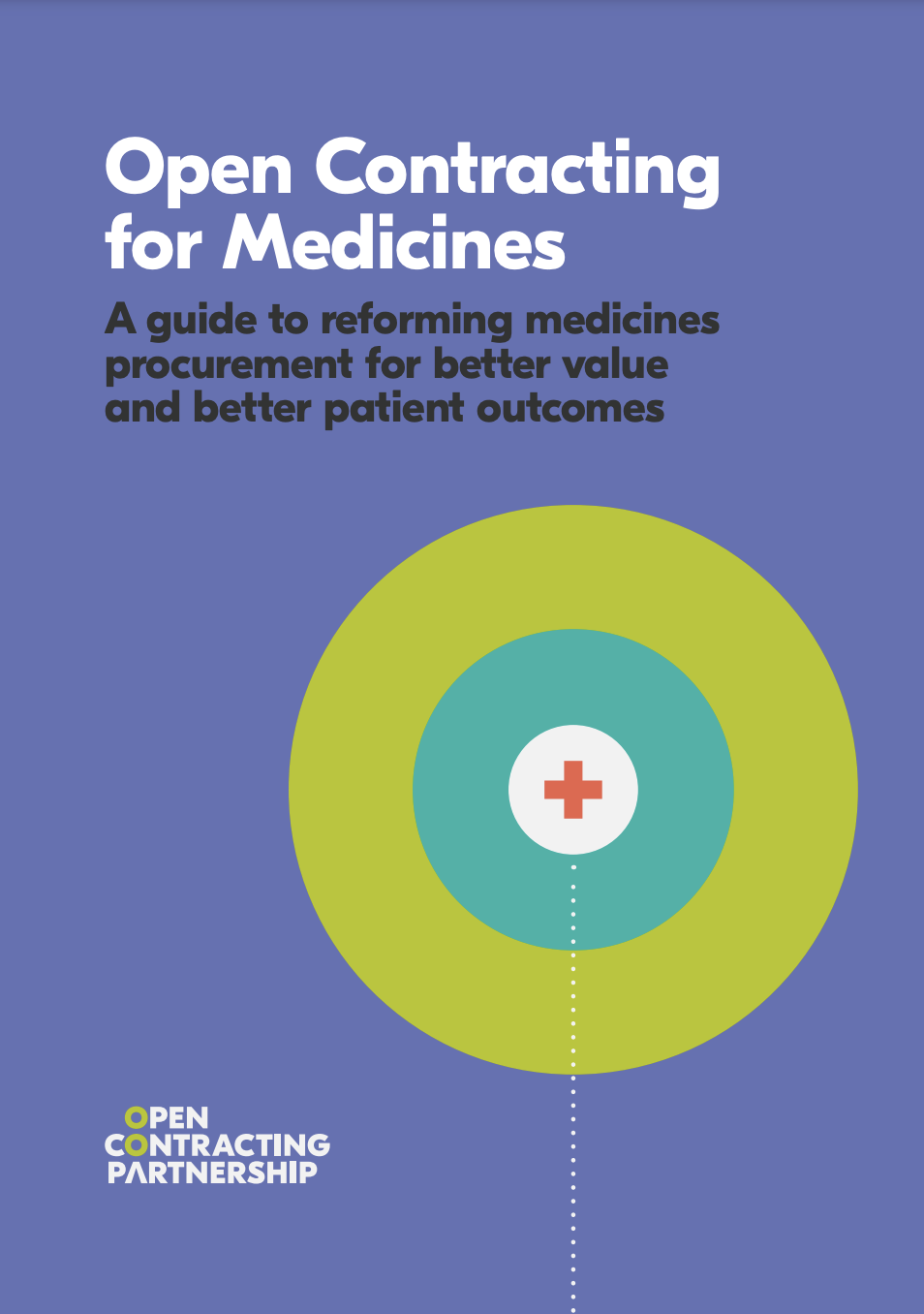The right medicine:
open contracting in health
The OECD’s Foreign Bribery Report estimates that, when paid, bribes may add up to 14% to transaction values in the health sector.
Poor public contracting contributes to many problems in the health sector: staff shortages, bribery, overcrowding, low quality or unaffordable medicines, and useless equipment, to name just a few. According to the World Health Organization, four of the ten leading causes of inefficiencies in the health sector are procurement-related.
To achieve the UN’s Sustainable Development Goal 3 of effective universal healthcare for everyone, the world will need a massive increase in value for money in healthcare. Smarter procurement of medicines, technology and medical services has a huge role to play in achieving this goal, as it constitutes a large part of health spending (almost 30% of health budgets, according to the OECD). It’s often poorly done, often involving lots of paperwork and very little competition, market intelligence or effective planning.
Open contracting can help by converting paper and siloed databases of information into actionable open data, and by embedding feedback and engagement of users into strategic procurement reforms. It allows governments to better plan purchases, aggregate demand, check for mispricing and look for red flag warning of malfeasance or fraud. The introduction of open contracting reforms in Ukraine helped lower prices for medicines in the country by 6%. Savings on health procurement rose to 34% on average when these purchases were first made using ProZorro, a system driven by open contracting principles and open data.
Our health impact stories
Emergency procurement for COVID-19: Buying fast, open, and smart
In the face of the global public health response to the Coronavirus, rapid and efficient procurement of life-saving goods and services is essential. Amid the potentially necessary reliance on emergency procurement procedures and negotiated arrangements, transparency of the contracts and money spent to tackle COVID-19 is key for the response to be smart, sustainable, and money is spent in the public interest. Complete and open data is an important part to ensure citizens and journalists can hold their leaders to account.
We’d love to share your experiences and projects responding to the Coronavirus pandemic, locally or globally. Get in touch.
Projects and partners
Transparency International Healthcare Initiative
Building on twenty years of experience in this and other sectors, Transparency International’s Health Initiative is taking up the challenge of understanding, identifying and combating corruption in this vital sector. The program wants to achieve change in the pharmaceutical and healthcare sector through reducing corruption and promoting transparency, integrity and accountability.
Open Contracting For Healthcare (OC4H)
The initiative led by TI UK is currently scaling up across 5 countries in Asia and Africa aiming to build governments’ capacities to implement open contracting in public health procurement, facilitate the diversity of suppliers in health sector public procurement while bringing together small, medium and large enterprises, and increase sustainable engagement of civil society in public procurement processes through network strengthening and capacity building.
Working Group on the Future of Global Health Procurement
The group launched by the Center for Global Development is exploring how the global health community can ensure the medium- to long-term relevance, efficiency, quality, affordability, and security of global health procurement. The recommendations are summarized in the report Tackling the Triple Transition in Global Health Procurement
Mitsubishi Financial Group
We are collaborating with Mitsubishi Financial Group on joint research into how more efficient procurement can help us achieve SDG3.
How can open contracting help exactly?
Healthcare procurement is dominated by huge asymmetries of information; governments are far too often price takers rather than price makers.
The Open Contracting Data Standard (OCDS) enables the disclosure of data and documents at all stages of the contracting process by defining a common data model, which can be compared across countries. More than 30 countries use External Reference Pricing Models, OCDS could reduce limitations related to the complexity of price comparison. Introducing it to medicine procurement may help to significantly increase its efficiency. It would allow governments to better plan purchases, aggregate demand, check for mispricing and look for red flags warning of malfeasance or fraud.
Improving efficiency does not mean simply reducing prices. Public procurement of medicines has a lot of challenges; including the formulation of national essential medicines lists, demand collection and good procurement planning, tendering and awarding, medicines delivery and final use.
Introducing OCDS to medicines procurement will help not only at the country level but also internationally, as publishing data against a single standard will help to conduct high-quality price referencing for identical products. Having such cross-country price information, buyers can easily obtain a fair deal in a global pharmaceuticals market which is today neither transparent nor efficient.
As a recent analysis by the Center for Global Development shows that even more attention will be put on procurement due to SDG3 due to a triple transition. Countries will need to make 1) a transition from donor funding (that often does the procurement for them), 2) a transition beyond just treating infectious to noncommunicable diseases such as cardiovascular disease, cancer, and diabetes and 3) a transition in national healthcare organisation as they move away from siloed disease-specific programs and out-of-pocket spending toward universal health coverage.
Making the Case for Open Contracting in Healthcare
This report with the Transparency International Pharmaceuticals and Healthcare program makes the case for open contracting in healthcare procurement based on case studies from Honduras, Nigeria, and Ukraine. The report discusses standards to disclose information and collaborative monitoring of medicines procurement across civil society, government and business to increase the integrity, fairness, and efficiency of public contracting.

